“I was cruising along, and then life threw me a curveball that changed everything. It may be a drop in the ocean as far as my work is concerned, but I’m happy to contribute to providing sustainable livelihoods for marginal farmers, mainly women, who may not even know me”
Meenakshi Bharadwaj
Founder, Aranyam Natural Options
https://aranyam.co.in/pages/about-us
Ditty Maria Dominic and Bhuvana N interacted with Meenakshi Bharadwaj, founder of Aranyam Natural Options based at New Delhi to learn how she embarked an inspiring entrepreneurial journey, lighting up the lives of smallholders in the North East of India.
| Aranyam Natural Options, popularly known as Aranyam Naturals is a Delhi-based social startup founded by Meenakshi Bhardwaj. It sells diverse organic products and food blends sourced from tribal farmers in North-East India. The organization’s focus is twofold: supporting tribal farmers and providing customers with a healthy, organic way of living through products sourced from farmers. |
What motivated you to take the entrepreneurial leap?
The year 2015 was when I transitioned from being a freelance consultant in the education sector to begin a remarkable venture, after my work led me to the picturesque Meghalaya for a CSR conference. During my stay in Meghalaya, a chance meeting with a missionary who works with tribals in the remote villages of the North-East was the turning point. Our interaction resonated deeply, and as a parting gesture, she gave me Lakadong turmeric and forest honey – sourced directly from local farmers of her village. While I attempted to extend monetary gratitude, she instead asked me to help the very poor farmers, predominantly women, who had been cultivating this extraordinary turmeric for years using traditional farming methods.
I was initially unaware of how Lakadong turmeric was different from that available in the market, until the missionary told me about its exceptional qualities and its pre-eminent position among types of turmeric due to its remarkably high curcumin levels compared to conventional varieties. This revelation left an indelible mark on me, and I committed myself to the cause. However, upon my return to Delhi, the complexities of life took over, relegating my promise to the periphery. Nonetheless, I maintained regular communication with the farmer and every subsequent conversation with her left me with a sense of guilt, knowing that I hadn’t been able to provide her the help she needed.
However, I decided it was time to take the first step. A laboratory testing of the turmeric revealed it had an unprecedented 7-10% curcumin content compared to 2-3% found in conventional turmeric varieties. This revelation felt like a divine sign and left me with a feeling that I held something truly exceptional in my hands. It served as a powerful impetus, driving me to support the dedicated farmers behind this remarkable produce that is cultivated naturally. This led to the creation of Aranyam Naturals in 2017.
When I look back, it is as if life decided to hit the reset button and steer me in a completely different path just when I thought I had figured it all out. Destiny, it seems, has a remarkable way of revealing itself in the most unexpected moments.
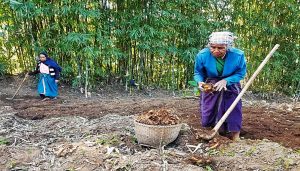 Harvesting of Lakadong Turmeric
Harvesting of Lakadong Turmeric
Could you share some insights into Aranyam Naturals’ inception and initial days? How did you navigate the challenges and opportunities that arose during that time?
My background added to the challenge of initiating this endeavor from the ground up. Devoid of substantial investors or elaborate funding, my resolve and determination became the guiding force in my journey. I bought 100 kilos of Lakadong turmeric from the farmers of the region as a trial. Since I had no marketing/selling experience, the roadmap to unlocking its potential eluded me. I started by introducing the turmeric to friends, family and any receptive audience, but despite my diligence, I was left with a lot of surplus.
That’s when I decided to sell it through the Amazon platform. Though this idea seemed simple, it wasn’t without its complexities. Establishing a brand presence, aligning with trademark protocols, and navigating legal intricacies required meticulous attention. Google proved useful in the learning exercise and I could sell the remaining stock of the first batch through Amazon, marking a moment of pride.
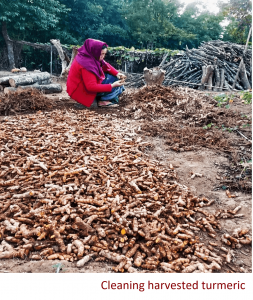 Yet, the voyage wasn’t bereft of challenges, exemplified by a curious customer inquiry concerning the nature of the turmeric – raw or boiled. Lacking agricultural expertise, I sought counsel from my social collaborator in Meghalaya. She explained that the turmeric was, in fact, raw turmeric powder. Lakadong turmeric’s resistance to fungal attacks unlike other varieties, eliminates the need for boiling. In retrospect, this journey has been a continuous quest for knowledge, a steep learning curve punctuated at each stage. From inception to the present, the journey has been a narrative of evolution, growth, and ongoing exploration.
Yet, the voyage wasn’t bereft of challenges, exemplified by a curious customer inquiry concerning the nature of the turmeric – raw or boiled. Lacking agricultural expertise, I sought counsel from my social collaborator in Meghalaya. She explained that the turmeric was, in fact, raw turmeric powder. Lakadong turmeric’s resistance to fungal attacks unlike other varieties, eliminates the need for boiling. In retrospect, this journey has been a continuous quest for knowledge, a steep learning curve punctuated at each stage. From inception to the present, the journey has been a narrative of evolution, growth, and ongoing exploration.
An initial affiliation with around 20 odd farmers marked the start of our venture. We slowly increased the procurement quantity as more farmers began seeking our help. During this time, I realised that solely focusing on turmeric might hinder the business’s expansion potential, considering the already saturated turmeric market. After a lot of research, consultations, reading on ayurveda, the idea of value addition came up. It spurred a fresh chapter which involved the crafting of unique turmeric health blends, enhanced by the inclusion of ingredients such as black pepper, ginger, cinnamon and cardamom. This wasn’t merely about mixing ingredients; it was the harmonious fusion of spices for well-being.
Such an evolution was laden with challenges. Sourcing quality ingredients was a premier requirement. Capitalizing on our existing network, we obtained exceptional organic ginger from the North-East. Premium cinnamon with exceptional medicinal properties was sourced from Sri Lanka and cardamom was sourced from the tribal belt in Odisha, from a woman farmer whom I coincidentally connected with at the Women of India Organic Festival, 2018. It was a bond founded on mutual need, a symbiotic partnership where quality met demand.
Subsequently, the farmers from Meghalaya offered locally-made immunity-boosting gooseberry (amla) candy and sun-dried ginger salty. The ginger undergoes a process of sun-drying after being grated and combined with lemon and salt. It was important to me that I commit to procuring amla candy only if it was prepared using jaggery, as a majority of our customer base preferred to avoid white sugar. The response to both these products has been remarkable, although production quantities remain limited due to resource constraints and packaging challenges faced by the farmers. As time progressed, our product range expanded to a diverse array of 25, calling for increased raw material procurement. This meant providing support to an even greater number of farmers. I rented out a small place, employing a small team of two girls and two boys who do the sieving, peeling, grinding, making blends, packaging and labelling.
I started by procuring 100 kg of produce in the first year. Today we have crossed 1 metric tonne. In essence, our journey has been one of constant evolution, fuelled by the recognition of opportunities and the unwavering commitment to deliver exceptional quality products to our customers. My family has been my biggest support in this journey.
How do you formulate the recipes for the blends? Have you availed any technical and financial support?
I have not undergone any training or incubation till now. The blends are formulated using my own research and online research. The precise proportion of each ingredient is of paramount importance in the preparation of blends, towards which I invest lot of researching time. We’re serious about quality, rigorously testing blends despite the cost.
I believe that sponsored training and incubation often lack specificity, and don’t cater to the precise needs of my venture. Moreover, I find the paperwork and legal requirements associated with obtaining financial aid highly cumbersome. I am reluctant to take loans given the potential risks, particularly given my age. My path is unique – a blend of research, intuition, and reluctance to tread conventional routes
How do you market your products? Has digital marketing helped?
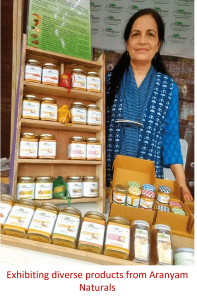 Right from the outset, our market entry was marked by a strategic debut on Amazon, spearheading the launch of Lakadong turmeric and its intricate blends. Our sales avenues now witness a dynamic influx of orders through our website on Shopify, WhatsApp, and Instagram platforms. While we initially also explored collaborations with retail outlets, the inherent trade-offs in terms of margin absorption and delayed payment cycles prompted us to discontinue this route, with the exception of one organic retail outlet – Nature’s Soul, which was very prompt with payments.
Right from the outset, our market entry was marked by a strategic debut on Amazon, spearheading the launch of Lakadong turmeric and its intricate blends. Our sales avenues now witness a dynamic influx of orders through our website on Shopify, WhatsApp, and Instagram platforms. While we initially also explored collaborations with retail outlets, the inherent trade-offs in terms of margin absorption and delayed payment cycles prompted us to discontinue this route, with the exception of one organic retail outlet – Nature’s Soul, which was very prompt with payments.
The weekend artisan markets in Delhi have proven transformative in our pursuit – the credit for the exceptional sales in these markets goes to my husband. Our participation in artisan market events has yielded significant dividends. Notably, our participation at the Women of India Organic Festival in 2018 and at the Global Organic Expo in 2022 and 2023 was attributed not solely to our signature turmeric offerings, but equally to our portfolio of blended products. Another milestone will be our participation as a gifting partner at the Ayuryog Expo scheduled on 21 -25 September 2023. Thus, the comprehensive marketing strategy of ours spans both the digital expanse and tangible real-world interactions.
How has the feedback from customers been?
Feedback from our customers are blessings like no other. Contented customers validate our products. I have a distinct recollection of one such customer. A doctor from Bengaluru reached out to us after having explored multiple turmeric brands. Our product emerged as the singular answer to his need. The satisfaction derived from such endorsements is unparalleled.
Another feedback that I received was for a novel turmeric blend for pets, melding the fibrous essence of turmeric with black pepper together with a measured infusion of coconut oil that yielded a remarkable immune-enhancing concoction for our canine companions. I found that my dog loved it and it seemed to boost his immunity. After lab testing, it found its place in our product array on the website.
Another customer sought help for his three-year-old Labrador grappling with arthritis. While we could not promise the blend would work, a sample was dispatched to him. A few weeks later, he called to inform that the dog’s arthritic discomfort had abated, and he was running around like before. However, what was surprising was his creation of a viral video documenting our product’s transformative impact on his pet’s well-being.
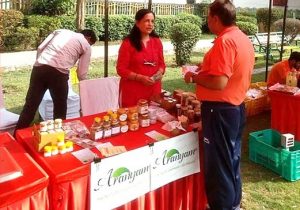 Interacting with customers at weekly artisanal market
Interacting with customers at weekly artisanal market
How are digital tools impacting your enterprise?
Digital tools are helping immensely in my entrepreneurial journey, and have greater potential to scale my enterprise. Initially, our market foothold was mainly within e-commerce platforms such as Amazon and Shopify. I believe that digital landscapes function as a dynamic force with the power to reach a broader spectrum of consumers.
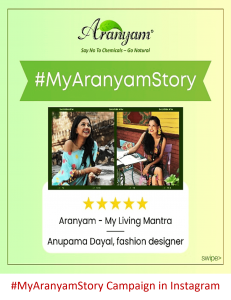 This year, a few students from a mass media institute in Delhi interned with us. Their efforts not only elevated our social media presence, particularly on Instagram, but also led to blogs about our products. Their contributions began a process of active engagement across Instagram, Facebook, and LinkedIn wherein we narrated our journey, work, products and how to order them.
This year, a few students from a mass media institute in Delhi interned with us. Their efforts not only elevated our social media presence, particularly on Instagram, but also led to blogs about our products. Their contributions began a process of active engagement across Instagram, Facebook, and LinkedIn wherein we narrated our journey, work, products and how to order them.
The resourceful interns ignited the concept of social media campaigns. Initiating the #MyAranyamStory campaign on Instagram, we encouraged customers to share their personal experiences with us. The response was heartening. Many customers, including celebrities, shared their ‘Aranyam story’ on Instagram. Remarkably, this initiative was a big success and our customer base grew by 133%.
However, our digital expedition did not culminate there. An influential editor from a renowned magazine, who also happens to be a loyal customer, authored a piece extolling our products. Subsequently, the impact was profound as enquiries poured in from across India. Venturing onward, our next digital frontier is YouTube, for which we are planning diverse ways to incorporate our products seamlessly into consumers’ daily routines.
What major challenges did you face in your entrepreneurial activities?
Navigating the dynamics of entrepreneurship is akin to juggling and necessitates prudent financial management. I have not sought financial assistance, and whatever money we earn is ploughed back to support more farmers. To sustainably support the farmers, procurement needs to be regular, and lack of funds is a major constraint.
The pandemic brought on several challenges. While turmeric was deemed an ‘essential’ commodity, we struggled to make sales. However, the commitment to our farmers remained unwavering in those difficult times even though sales were low. The transportation of turmeric and honey from Meghalaya to Delhi was another major challenge during that time.
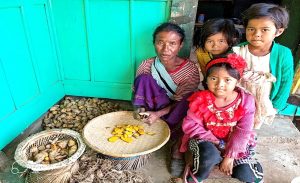 A woman farmer from Meghalaya with the harvested Lakadong turmeric
A woman farmer from Meghalaya with the harvested Lakadong turmeric
Venturing into the sphere of government services unfurls an additional layer of complexity. Though we are duly registered as an MSME, and are often invited to participate in organic expos and events, the prohibitive cost of procuring a stall is a hurdle. The initial capital outlay constitutes a formidable obstacle. Even though there is reimbursement, we do not have the funds to invest upfront and then wait for the reimbursement. The money gets locked up and it takes anywhere between 3 months to one year to get the reimbursement, which is why in spite of being an MSME I often do not market or publicize through these expos.
Organic certification has its own challenges and is very tedious and expensive. Many opportunities have been lost due to the lack of an organic certification. The farmers too don’t have the time, resources and knowledge to get produce certified.
Packaging is another major problem, especially for honey. By the time honey reaches Delhi by road from Meghalaya, sometimes a lot of it spills over. While the product cannot be packaged in plastic bottles, the handling of glass jars is very cumbersome and expensive. The spend on packaging, coupled with logistics and accompanying losses, are all borne by the enterprise.
What would you rank as your greatest achievement as an entrepreneur?
Assisting agricultural stakeholders in creating a reliable and sustainable livelihood has been my greatest achievement. We are dedicated to honouring commitments and uplifting farmers, particularly the exceptional women who have nurtured the land across generations.
Aranyam Naturals serves as a conduit between farmers and consumers, grounded in unwavering integrity, and is an endeavour that empowers, prioritizes quality, and uplifts. It is truly fulfilling to be able to uplift marginalized farmers, particularly women, and simultaneously offer high-quality products to customers while maintaining ethical standards.
Your awards & recognition
Aranyam Naturals was recognized for transforming lives through agribusiness at the Agripreneur India Meet in 2019. We were also invited by the government to participate in the World Food India Expo, 2017, a global food processing industries event.
 Aranyam Naturals being recognized at Agripreneur India Meet 2019
Aranyam Naturals being recognized at Agripreneur India Meet 2019
What are your future plans?
Entering the export market is a major goal. I am currently engaged in the documentation and legal protocols required to spread our products globally. Supporting a greater number of farmers is another goal. Increasing our presence across social media platforms gives wings to our narrative, enabling us to reach an even broader audience, spreading our story of excellence and support to more households and hearts. Our journey is interwoven with passion, meticulous care, and aspirations.
What is your message to aspiring entrepreneurs?
Success requires patience, dedication, discipline, and an iron will to never give up. There is no right definition of a successful business. Focus on providing benefits and being fair to all stakeholders involved – from suppliers to customers – and you will always find your business to be in demand.
Acknowledgement: This interview was done as part of the IRRI-CRISP ongoing project ‘Mapping of Good Practices in Digital Innovations in India Supporting Women Agrientrepreneurs’.
 Ditty Maria Dominic, Research Fellow at Centre for Research on Innovation and Science Policy (CRISP), Hyderabad, Telangana, India. She can be reached at: ditty794@gmail.com
Ditty Maria Dominic, Research Fellow at Centre for Research on Innovation and Science Policy (CRISP), Hyderabad, Telangana, India. She can be reached at: ditty794@gmail.com
 Bhuvana N, is a Consultant at the Centre for Research on Innovation and Science Policy (CRISP), Hyderabad. She has a PhD in Agricultural Extension, from Professor Jayashankar Telangana State Agricultural University, Hyderabad. Her research interests include organizational ecosystems and effectiveness, social networks and technological change. She can be reached at: bhuvanaditya7@gmail.com
Bhuvana N, is a Consultant at the Centre for Research on Innovation and Science Policy (CRISP), Hyderabad. She has a PhD in Agricultural Extension, from Professor Jayashankar Telangana State Agricultural University, Hyderabad. Her research interests include organizational ecosystems and effectiveness, social networks and technological change. She can be reached at: bhuvanaditya7@gmail.com

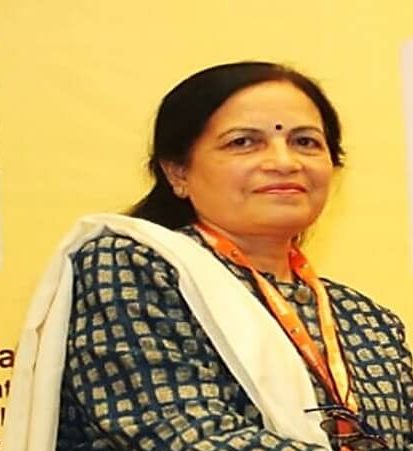



“The evolution of Aranyam Naturals is something interesting. There are umpteen number of such ventures and entrepreneurs who are involved in this trade of procuring forest produce, process and sell to the consumers at premium prices. Even now there are a large number of traders who usually exploit the tribal farmers in procuring the forest produce at throw away prices. But, it is good to know that entrepreneurs like Mrs Meenakshi Bharadwaj are helping the tribal farmers by providing sustainable market for forest produce like turmeric, honey, spices etc Best wishes in her future endeavor of entering into export market.
This face to face interview enriched my knowledge about Lakadong turmeric which differentiates itself from conventional turmeric in containing high amount of curcumin and does not require boiling. Thanks to AESA”.